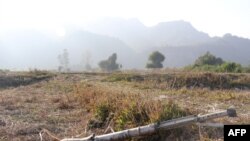Myanmar police said the army had filed a lawsuit against Reuters news agency and a local lawmaker for criminal defamation, weeks after the military objected to a news story published about the death of two Rohingya Muslim women as a result of shelling in Rakhine state.
After publication, the army said its artillery fire had not killed the women or caused other civilian injuries and blamed insurgents of the Arakan Army (AA), who are fighting for greater autonomy in Rakhine state. The AA denied responsibility and accused the army. Reporters are banned from the area where the incident happened.
Police Lieutenant Kyaw Thu, the acting station head in Buthidaung township, in the north of Rakhine state, told Reuters both the news agency and the lawmaker were being sued under section 66D of the Telecommunications Act.
The section, which has been used to jail government critics in the Southeast Asian country, outlaws online defamation and carries a maximum sentence of two years in prison.
Kyaw Thu said that police had not yet contacted Reuters about the case and would seek to do so.
"We are trying to make an approach in so far as we can, to find out where Reuters news agency is, what kind of organization it is and the reporter and the editor," he told a Reuters reporter on Sunday before putting down the phone.
He said that police had requested permission from the speaker of Myanmar's national parliament with regards to proceeding with the case against lawmaker Maung Kyaw Zan, who represents Buthidaung.
The case follows an army complaint about a story published by Reuters on Jan. 25 in which the lawmaker was quoted as saying that the army’s artillery fire had caused the deaths of the two Rohingya women.
The army held a news conference on Feb. 4 to complain about the story, after which Reuters updated the story to reflect the army’s position.
The army subsequently filed a complaint objecting to the Reuters story to the Myanmar Press Council (MPC), which adjudicates disputes between authorities and news media.
"Reuters stands by the reporting that is of concern to the military and is the subject of an ongoing discussion with Myanmar’s Press Council," a Reuters spokesperson said.
"We do not believe there is any basis for a criminal action against Reuters or our journalists under Myanmar law. We have not seen any criminal complaint against Reuters, and so cannot comment further at this time."
The member of parliament said that it was unfair to bring a lawsuit against him.
"As a representative of the people, I listened to what the people told me and I spoke about it," he told Reuters by phone. "I will just have to face the lawsuit and receive the judgement from the court."
Zaw Min Tun, a spokesman for the military, confirmed the complaint against the lawmaker but said he did not know about the lawsuit against Reuters.
Rakhine state is the western region from which more than 750,000 Rohingya fled in 2017 following a military crackdown.
Myanmar is facing charges of genocide at the International Court of Justice in the Hague over the crackdown. The army denies genocide, saying it was fighting a legitimate battle against Rohingya militants who attacked police stations.
Two Reuters reporters were released from a Myanmar jail last May after spending more than 18 months behind bars, accused of breaking the official secrets act in a case that sparked an outcry from diplomats and human rights advocates.
Before their arrest in December 2017, they had been working on an investigation into the killing of 10 Rohingya Muslim men and boys by security forces and Buddhist civilians in Rakhine state.





